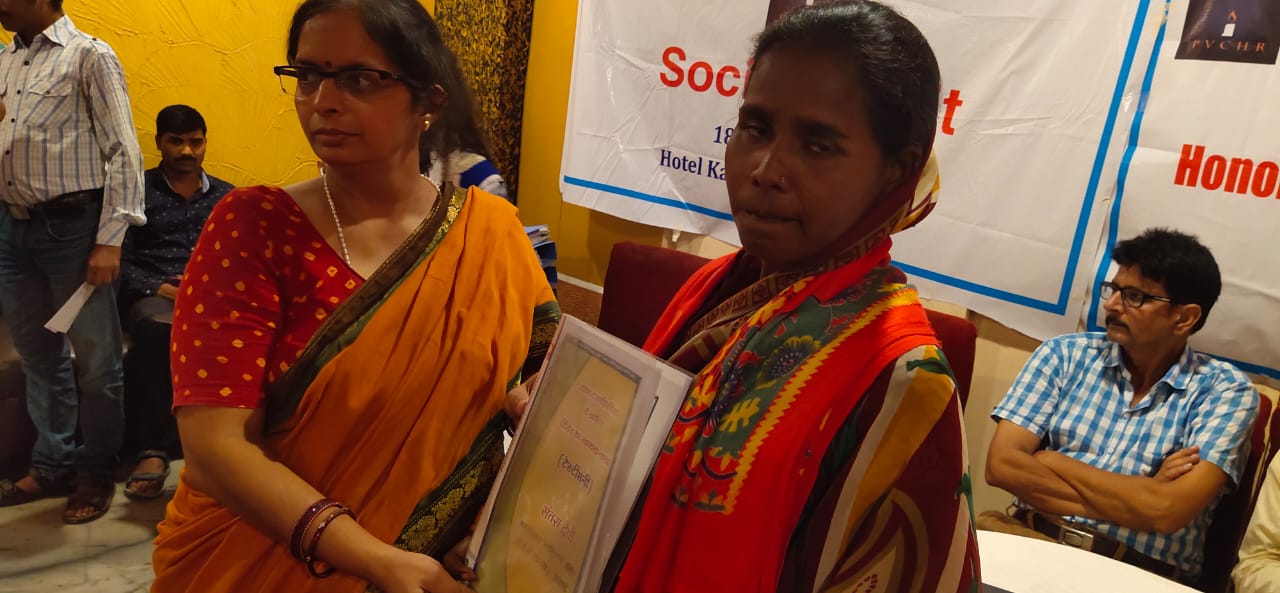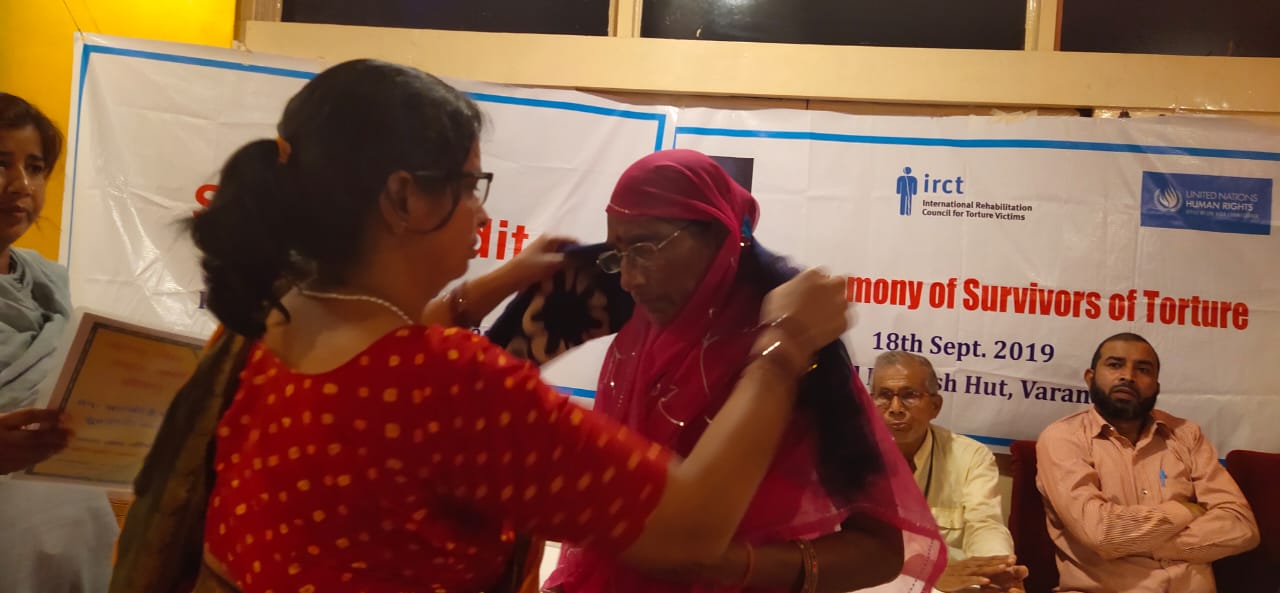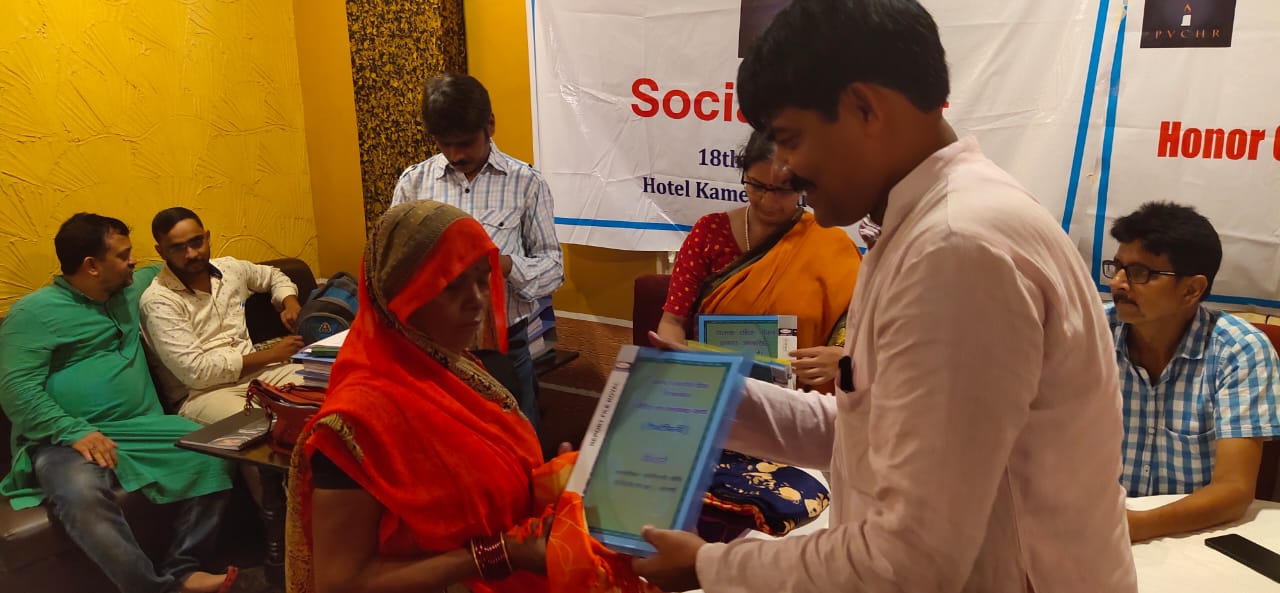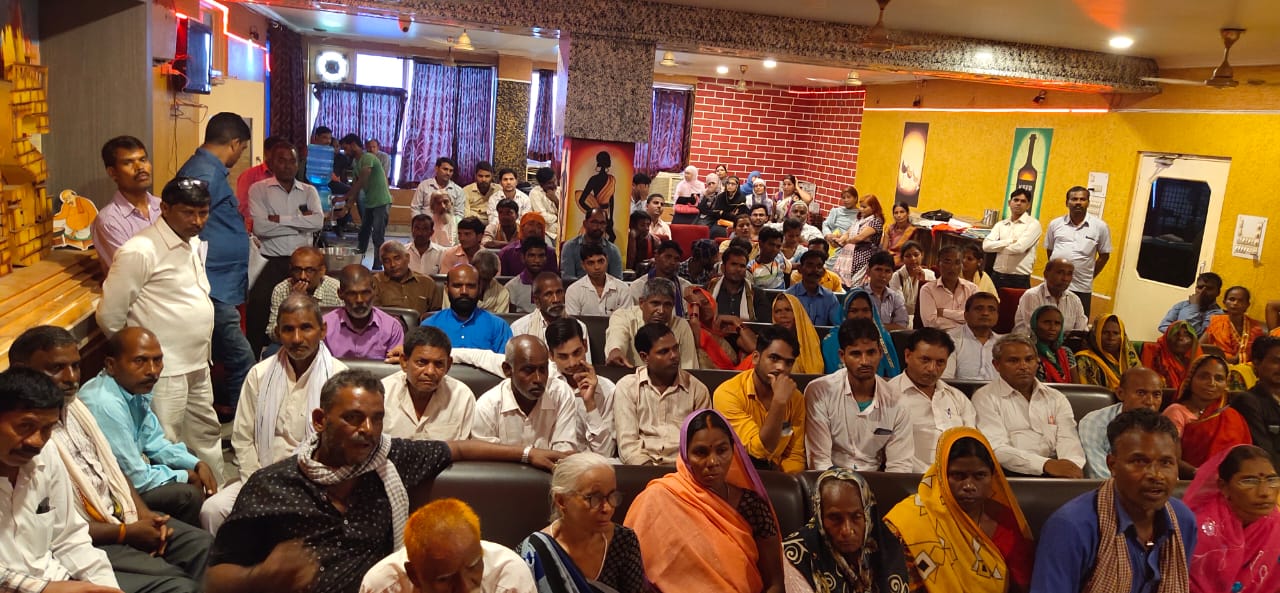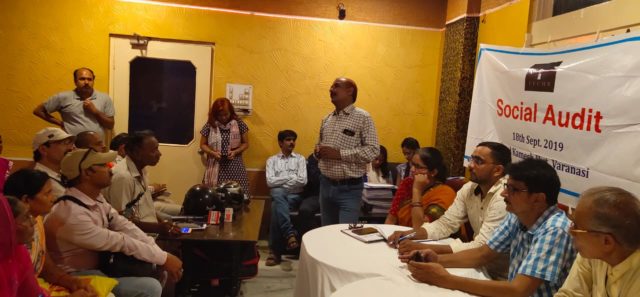In 2000, PVCHR (People’s Vigilance Committee on Human Rights) started its work in the southern ghetto of Belwa village, where most people from other backward castes (OBCs) and Dalits, such as Patels, Mushahars, Kohars, Lohars and Nuuts resides.
The village has 8 ‘purvas’ (divisions), but there is only one government school, which is not at all sufficient to meet the educational demands of the village
More Than 80% of Children In Belwa Are Malnourished
According to Gaharu Mushars “I had gone only once to the school and there upper-caste aristocratic children attacked me and hit on my head after that I never went to the school. This clearly shows the people are full of biases towards us. But now the situation has changed somewhat and we get the opportunities also and therefore, now I am learning everything without any fear. Now we have stopped doing such works like plucking leaves and making eating plates. We want to be free from doing these dangerous and risky jobs. If somebody provides us with different types of jobs, we would want and do that.”
PVCHR, with the support from Fellowship from Ashoka Innovator for Public, Child Rights and You (CRY) and later with the support of Sir Dorabji Tata Trust (SDTT) have been operating Pre-Primary Center and Non-Formal Center to educate the children of the marginalised community.
Bhotu, a 55-year-old bonded labourer, and his brother, Gaharu were freed from the clutches of brick kiln owner Rajendra Tiwari. This work has been hazardous with meagre wages. Some years ago Muneeb, Monu, Seema and Karmina, all aged between nine months and eight years, died working in this industry.
Though the district administration claimed the kids died because of various ailmentss, the villagers hotly contest this. “We cook once in three or four days, can our children be healthy?” asks Kismati, whose three years old son Muneeb died on May 29.
“The primary health centre at Baragaon had recorded that the children were suffering from severe malnutrition and weighed only 10 kg. PVCHR during its health camp found that more than 80% of kids were malnourished. It took three deaths for the district authorities to issue Antodaya Anna Yojna (AAY) cards (which entitles the holder to 35 kg of rice and wheat at a subsidised price of Rs 95),” said Lenin Raghuvanshi of Founder and CEO PVCHR.
Before that, they survived on low-quality grain and chaff, doled out to them by the kiln owner instead of cash or just starved. “We go to work even when someone has died and the body is at home”. It is almost noon by the time the women get around to cooking, but the meal is ready in a jiffy. A few rotis and a bowl of saltwater! Dip, dip, dip…and the hungry children gulp down their first, and last meal of the day.
”By evening, they will be crying again, but a slap or two will quieten them down,” says Laxmina, wife of a brick kiln worker and mother of three. Her face is deadpan, but her voice betrays her desperation. These months are the worst in Belwa. With the brick kilns closed from July to October, the hamlet’s Musahars, the bottom rung in India’s caste system, struggle to survive. And it is children who are the most vulnerable.
Denied The Right To Vote
Rajendra Tiwari maintained the culture of silence through police torture and marginalised the OBCs and Dalit communities, by keeping them in bondage, depriving them of education and seizing their identity cards. He prevented the people of Badepur from voting and even stopped some people from getting their photo-identity cards made
In November 2001, people from the Dalit Community were mobilised to participate in NAFRE rally in Delhi to demand a change in the educational policy of the government. Mr. Tiwari sensed the wave of dissension rousing in the Dalit community and openly threatened to destroy the homes of those who attended the rally. His muscle men disrupted the meeting in Belwa being addressed by the Convenor of PVCHR, physically attacked and abused PVCHR activists and threatened to kill them
The result was visible in the February 2002 state election, when for the first time, Dalit men and women openly challenged Mr. Tiwari. Many of the Women had come armed with chilli powder and the men with sickles. Many of them could not vote as they did not have the proper documents. (It is again because Mr. Tiwari had prevented their Ration Cards from being ready, in time, as well as the inclusion of their names in the Voters List).
The issue got wider media publicity that helped in checking his abusive behaviour. The BSA/ABSA also visited Badepur and confirmed the urgent need for a school. The final blow was the visit of an NHRC team and the transfer of the village secretary from Belwa to Lakhimpur. By that time the people of Badepur had become more confident.
With financial Help from PVCHR and their own contribution of labour and material, the community school was improved upon with better roofing and rooms. The student population soon exceeded 200 children. PVCHR was developing it as a model centre.
In 2002, being the member of District Vigilance Committee, Dr. Lenin filed complaints, based on which there was a criminal case against Rajendra Tripathi registered by the Magistrate (Sub-Divisional Magistrate).
The case is pending against Tripathi in court. In 2002, a local newspaper, Dainik Jagran, published the news of the raid, mentioning that on the direction of NHRC, the SDM and some labour officials raided the kiln of Tiwari, and later, an FIR was filed against him, at the Phulpur Police Station, under IPC 374.
Gaharu complained that Tiwari had paid Bothu Rs.800.00 but the latter claimed that he had paid Rs.1400.00. On the evening of the 24th, both Bothu and Gaharu had complained before the SSP, who issued orders to the in-charge of Phulpur Police Station. Four women bonded labourers, i.e., Champa Devi w/o Gaharu Musahar, Kismati Devi w/o Waharu Musahar, Hirawati Devi w/o Late Ramavatar Musahar, and Hirawati Devi w/o Bhothu Musahar, all belonging to the village Belwa, under police station Phulpur, had signed an Affidavit that they have been working as bonded labourers.
On May 2002, Justice Dr. Z.M. Yacoob, the Sitting Judge of the Constitutional court of South Africa and the Chancellor of the University of Durban visited Badepur and participated in a community lunch with the Dalits. All of this brought positive changes and raised the confidence of the Dalit community.
Rajendra Tiwari, the current village head of Belwa village, never planned to open any school for the Musahars and he engaged them as bonded labourers in his brick kiln factory. Even the BRC coordinator in his report stated that 211 children were employed in the brickfields and this ghetto was marginalised due to political bias and enmity.
In this context, on 8 August 2003, the children held a Child Parliament in front of the district headquarters and demanded a school in their area. On 26 August 2003, they observed tehsil diwas (day), 250 children walked 5 km from the Sant Kabir Jan Mitra Kendra to Pindra tehsil and submitted their demand to the Sub Divisional Magistrate (SDM) of Pindra. The SDM misbehaved with the children and ordered a lathi-charge on the children and the villagers. Dr. Lenin of PVCHR was detained under Section 151, and released after four hours, while the other three activists were charged under Sections 107/16.
Threatening To Kill Human Rights Activist Dr. Lenin Raghuvanshi
In fact, in August 2005, PVCHR supported a candidate against Tripathi as the village head in the local election. Tripathi immediately responded by ordering Ramasray Singh, a local criminal, to call the candidate S N Giri and Dr. Lenin over the telephone; saying that he has been asked by Tripathi to kill both Dr. Lenin and Giri for promoting a candidate in the village election.
Against this move, the AHRC issued an Urgent Appeal; three reporters responded from the United Nations, who wrote to the Government of India to provide protection to Giri and Dr. Lenin. The Election Commission of India also responded to the appeal, by sending their representatives to monitor the election, and ordering the then-District Magistrate to provide every security to Giri, and also to the Dalit voters during the election.
A criminal case was registered against Ramasray Singh, and he was arrested. The District Magistrate also issued shoot-at-sight orders against the criminals sponsored by Tripathi, if they tried to prevent the Dalits from participating in the electoral process.
It was for the first time since Independence, that the Dalits in Belwa exercised their right to vote. In March 2006, the cases of Belwa was brought in the Sixty-second session of United Nations General Assembly. Item 6 of the provisional agenda racism, racial discrimination, xenophobia and all forms of discrimination in the United Nations.
In 2007, PVCHR and Asian Human Rights Commission (AHRC) organised folk schools on the issue of malnutrition. Eight children had died due to severe malnutrition in the previous year in the Belwa village. The PVCHR, along with the AHRC, and other national and local human rights organisations, organised folk-schools in these villages, starting from Belwa. The PVCHR also invited the district administration, as well as officials from the Uttar Pradesh State Commission for Scheduled Castes and Scheduled Tribes, to participate in these sessions. The member of the Commission, Mr. Rajbahadur Yadav participated in one of these sessions held at Belwa on 21 May 2007.
Meanwhile, PVCHR also promoted the establishment of community centres in these villages, of which the community centre in Belwa, was inaugurated by the then DM Mr. Nithin Gokarnan. Mr. Gokarnan later served as the Divisional Commissioner of Varanasi.
In December 2007, PVCHR also planned to erect two monuments in Belwa. One was in the memory of the Musahar and the other for poor children who died of starvation in Belwa. In another event, the members of the Musahar and other socially marginalised families, took the solemn oath, in one of the folk school sessions. The content of the memorial tablet and the oath is in plain and simple language.
On 9 December 2007, Rajendra Tripathi has filed a complaint against Dr. Lenin and his colleagues, (Shruti Nagvanshi, Anupam Nagvanshi, Prem Nut and Kalwati) at the Phulpur police station, making false allegations against PVCHR and Dr. Lenin under IPC 505 B (Public tranquility) in crime no. 357/07.
The dream of marginalised people to educate their children was fulfilled, albeit to some extent, with the inauguration of a school by elementary education officer, Pradeep Kumar Pandey on 2 August 2009, with the exceptional contribution of Reshma Devi, a local resident of Belwa village.
She donated her own land and Jan Mitra Nyas (JMN)/PVCHR contributed in bearing the expenses for its registration. The inaugural session was witnessed by the key staff of PVCHR, Loreine B de la Cruz (Lou), chairperson of Balay in the Philippines, and Frauke Bergmann, interns from Germany and many teachers from the nearby government school and other people of the village.
